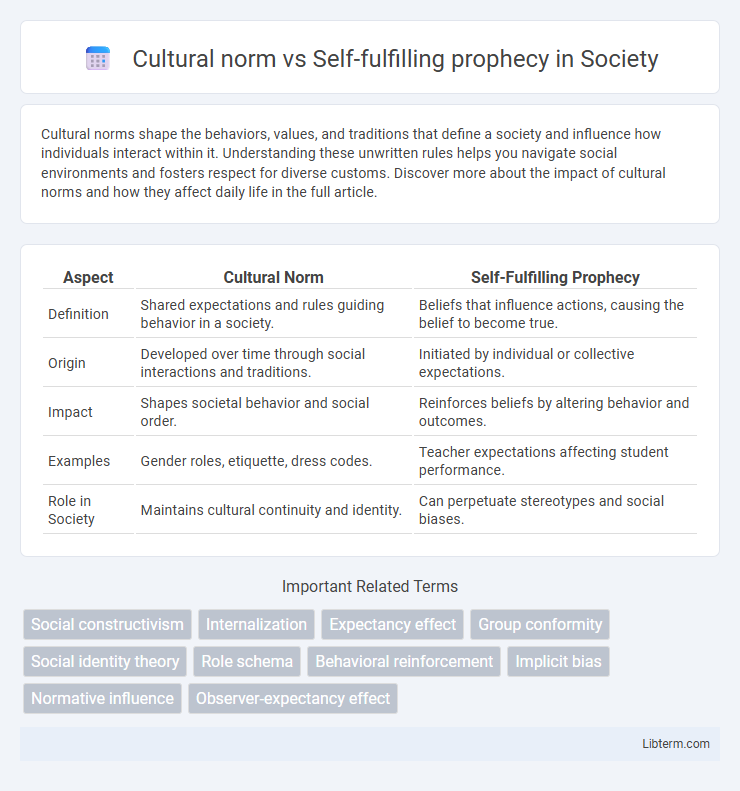Cultural norms shape the behaviors, values, and traditions that define a society and influence how individuals interact within it. Understanding these unwritten rules helps you navigate social environments and fosters respect for diverse customs. Discover more about the impact of cultural norms and how they affect daily life in the full article.
Table of Comparison
| Aspect | Cultural Norm | Self-Fulfilling Prophecy |
|---|---|---|
| Definition | Shared expectations and rules guiding behavior in a society. | Beliefs that influence actions, causing the belief to become true. |
| Origin | Developed over time through social interactions and traditions. | Initiated by individual or collective expectations. |
| Impact | Shapes societal behavior and social order. | Reinforces beliefs by altering behavior and outcomes. |
| Examples | Gender roles, etiquette, dress codes. | Teacher expectations affecting student performance. |
| Role in Society | Maintains cultural continuity and identity. | Can perpetuate stereotypes and social biases. |
Understanding Cultural Norms: Foundations and Influence
Cultural norms serve as unwritten rules guiding behavior within societies, shaping expectations and social interactions through shared beliefs and values. These norms can influence self-fulfilling prophecies by creating conditions where individuals conform to anticipated behaviors, reinforcing societal expectations over time. Understanding the foundations of cultural norms reveals their powerful role in directing collective conduct and individual identity formation.
Defining Self-Fulfilling Prophecy in Social Contexts
A self-fulfilling prophecy in social contexts occurs when an individual's expectation about another person or group influences behavior that causes the expectation to become true. This psychological phenomenon shapes social interactions and reinforces cultural norms by perpetuating anticipated behaviors and outcomes. Understanding self-fulfilling prophecies is crucial for analyzing how stereotypes and biases maintain societal structures and influence individual identity formation.
How Cultural Norms Shape Individual Behavior
Cultural norms dictate expected behaviors and values within a society, creating a framework that individuals internalize and enact in daily life. These collective expectations influence decision-making processes and social interactions, reinforcing predictable patterns of behavior. When individuals conform to cultural norms, they often fulfill roles that perpetuate these norms, making self-fulfilling prophecies critical in sustaining societal cohesion and identity.
The Psychology Behind Self-Fulfilling Prophecies
The psychology behind self-fulfilling prophecies reveals how individuals' beliefs and expectations influence their behavior, thereby reinforcing the predicted outcome. Cultural norms shape collective expectations, embedding specific behaviors that can trigger self-fulfilling cycles within social groups. This interaction highlights how internalized social scripts and anticipated reactions perpetuate personal and societal patterns through cognitive biases and social feedback loops.
Intersections: When Cultural Norms Become Self-Fulfilling
Cultural norms shape individual behaviors and societal expectations, often establishing patterns that individuals internalize and act upon, thereby reinforcing those norms. When these collective behaviors align with preconceived beliefs, they create self-fulfilling prophecies that perpetuate existing social realities, such as gender roles or educational achievement disparities. The intersection occurs as cultural norms influence perceptions and actions, which in turn validate and sustain the original norms, making change challenging without conscious intervention.
Case Studies: Cultural Expectations Fueling Prophecy Outcomes
Case studies highlight how cultural norms shape self-fulfilling prophecies by reinforcing expectations that influence individual behaviors and outcomes. For example, research in gender roles demonstrates that societal beliefs about women's abilities in STEM fields often lead to decreased performance and participation, confirming stereotypes. Similarly, studies in educational settings show that teacher expectations aligned with cultural biases can significantly affect student achievement, perpetuating achievement gaps.
Breaking the Cycle: Challenging Established Norms
Challenging established cultural norms requires disrupting the self-fulfilling prophecy that reinforces those behaviors, often ingrained through social expectations and repeated actions. Interventions aimed at promoting critical thinking and awareness can undermine these cycles by encouraging individuals to question and redefine accepted norms. Empowerment through education and inclusive dialogue fosters environments where alternative behaviors replace stereotypical patterns, breaking the cycle of conformity.
The Role of Education in Reshaping Beliefs
Education plays a crucial role in reshaping cultural norms by challenging deep-seated stereotypes and promoting critical thinking skills, which can dismantle self-fulfilling prophecies rooted in societal expectations. Through inclusive curricula and diverse representation, schools foster environments where students question biases and envision alternative outcomes beyond traditional norms. Empirical studies show that educational interventions targeting mindset shifts effectively reduce the impact of cultural stereotypes on individual performance and aspirations.
Impacts on Identity: Navigating Norms and Prophecies
Cultural norms shape individual identity by establishing expected behaviors and values that guide social interactions, often reinforcing collective conformity. Self-fulfilling prophecies influence identity through internalized expectations, where individuals adopt roles aligned with perceived predictions, impacting self-esteem and social performance. Navigating these forces requires balancing societal pressures with authentic self-expression to develop a resilient and adaptive personal identity.
Moving Forward: Building Adaptive and Inclusive Cultures
Building adaptive and inclusive cultures requires recognizing how cultural norms can shape behaviors and expectations, often reinforcing self-fulfilling prophecies within communities and organizations. By actively challenging limiting norms and promoting diverse perspectives, organizations enable individuals to transcend stereotypes and foster innovation. Creating feedback mechanisms and inclusive policies further supports ongoing cultural adaptation, ensuring resilience and collective growth.
Cultural norm Infographic

 libterm.com
libterm.com